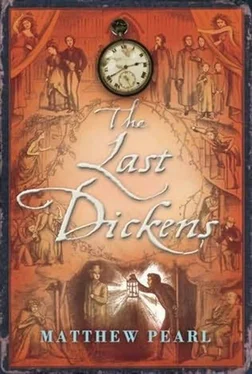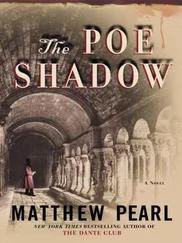“Your servant,” the doctor said, bowing, though not exactly promising patience.
“You treated Mr. Dickens after he collapsed?”
“I can assure you I did, Mr. Osgood,” the doctor said. “I see that in addition to disobeying my directions for your own health, you have added to Miss Dickens's grief. Perhaps it is best for both of you to leave Gadshill.”
Mamie had gone to sit in a quiet corner with the tazza to hide the fact that she was crying.
“Dr. Steele, perhaps-” Georgy started to object to his command.
But the imperious medical man gave her a steely-eyed look that combined a doctor's strict prescription and a collector's reminder of an overdue bill. Even the strong-willed voice of Georgina Hogarth was silenced.
“Good-bye, then, Mr. Osgood,” Steele said, vengeful over his disobedience.
“Good-bye,” Osgood replied.
“Wait.” Here was Henry, upright and with dried eyes. “I have not seen Miss Dickens smile like that in some time. If she weeps, it is in the joy of the small swatch of memories you and Miss Sand returned to her. Come, Mr. Osgood, let me show you two something before you go, if you have a few moments.” These words of the servant's were meant squarely for Dr. Steele, but were spoken to Osgood.
As Dr. Steele glared at them, Osgood and Rebecca followed Henry out of the room. “There have been very few people allowed in here since June the ninth,” said Henry, stepping across the threshold of the dining room with his eyes closed. “That is the place where he died.” It was a green velvet sofa with a stylish curving back.
“Were you in the room, Mr. Scott?” asked Osgood.
Henry nodded. “Yes, and I shall not fear to speak of it. Grief pent up will burst the heart, as the saying is.” His eyes became wide as he described the scene of Dickens's death. “The Chief collapsed on the floor of the room when sitting down to eat after working all day on The Mystery of Edwin Drood. Messengers rushed to town to retrieve Dr. Steele, while I helped carry a sofa from upstairs into the dining room, and then assisted Aunt Georgy in lifting him. He was mumbling.”
“Mr. Scott,” Osgood interrupted. “Did you hear anything that Mr. Dickens said when he did speak?”
“No. It could not be made out at all. Well, except one word I could hear.”
“What was that?” Osgood asked.
“A name. Forster. The poor Chief was calling for John Forster to be by his side. I daresay that shall be Mr. Forster's proudest moment. I know it would be mine had it been my name on his lips.”
As Dickens had continued to worsen, Henry was asked by Georgy to begin heating bricks at the furnace. “When I returned to this room, the somber doctors had cut away the Chief's coat and shirt. To see it! The room was crowded now-Miss Dickens and Mrs. Collins had hurried here from a dinner in London. Hours passed, and still he remained in an unconscious sleep. How I wished for another instruction to heat bricks or any such errand! I looked in on the scarlet geraniums in the conservatory and swept the tiles around them. Those were Dickens's favorites and I wanted the area clear for when the Chief woke up. He could look out and smell the conservatory's sweet fragrance through the open window.”
Amidst it all, there arrived a fair-haired, pretty, and tightly cloaked young woman, a woman whom everyone knew about even if they were not meant to. But the master of the house did not stir under the frightened gaze of her bright blue eyes, either. Deep into the night, the same stillness persisted. An even more somber doctor from London joined the others in the dining room. Pale and rattled, the London doctor pronounced brain hemorrhage.
“The poor Chief, he would never be moved from this sofa again.”
Henry bowed with a regretful frown that he could say no more.
“Thank you, Mr. Scott,” said Osgood. “I know it must be a painful thing to recount.”
“On the contrary. It is my finest honor to have been here.”

THE TRAIN INTO London could not move fast enough for the two travelers. A few hours after their arrival in London, Datchery had received the message from the landlord of the Falstaff and met them at their Piccadilly hotel. Osgood could not go to Scotland Yard without betraying William Trood's trust, but the eccentric Datchery, mesmerized or not, could investigate unfettered. Osgood poured out all the information about Edward Trood and his connections to his uncle's opium merchant friends.
“Remarkable!” Datchery said, his long slender frame pacing the floor up and down. He looked as though he might break into a laugh. “Why, Ripley, I believe you have turned a corner in the investigation!”
Osgood snapped his fingers. “If it's true, it all fits together now, my dear Datchery, doesn't it? When Dickens said there was something ‘curious and new,’ this is what he meant-he was opening the case of a real murder mystery. It was different from anything he had done before, different from anything Wilkie Collins or other novelists had written. Think of how one of the first chapters of Drood begins.”
Osgood had read the installments so many times, he could recite it from memory, but he removed the first installment from his trunk to point it out to Datchery. “For sufficient reasons which this narrative will itself unfold,” he read from the first sentence of chapter 3, “as it advances, a fictitious name must be bestowed upon the old Cathedral town. Let it stand in these pages as Cloisterham.”
“Indeed!” Datchery called out.
“The reason for the alias Cloisterham to stand in for Rochester,” Osgood said, “is that a real crime was about to be revealed, and a real criminal unveiled.”
Datchery nodded vigorously. “And when The Mystery of Edwin Drood began to be published in serial, every eye was on it, and every eye in the world of these opium pushers and smugglers could see in it the story of poor Edward Trood. Think of it: Nathan Trood is dead, but if he had help in the murder of his nephew, someone would fear exposure.”
“Except that William never involved the police. Edward's murderer may have felt comfortable for these long years,” Osgood said.
“Indeed. But if Dickens's novel revealed new clues, it could lead the police to the discovery of the facts of the actual case and to the other killers of Edward Trood!” Datchery interrupted himself by putting up a hand for silence. He pointed toward the door, where there was a slight shuffling noise.
“Miss Rebecca?” Datchery whispered.
“No, I do not think it can be her… Miss Sand is out making arrangements for credit at the bank in London for our stay,” Osgood said in a quiet voice. “The money we brought with us has melted away. She will be out another hour at least.”
Datchery motioned for Osgood to move aside and indicated that someone was eavesdropping on them. Then he grabbed the iron poker from the hearth. He stealthily made his way across the length of the well-furnished room and opened the door slowly. A strong hand shot out and grabbed Datchery's wrist, twisting it until the poker fell to the floor.
“Good God!” Datchery cried out, tumbling backward. Struck with a quick fist in the jaw, he staggered and fell.
“Help! Call for help!” Datchery moaned while attempting to drag himself away.
“No need for that, Mr. Osgood,” said the attacker.
Osgood had reached for the bellpull but, being addressed by name, stopped and stared at the newcomer with amazement.
The young man stepping toward him removed his cape and cap to reveal the figure of Tom Branagan. Tom Branagan! A man whom Osgood had not seen in more than two years-since the end of Dickens's American tour-now plunging through Osgood's hotel door in a brazen assault!
Читать дальше













